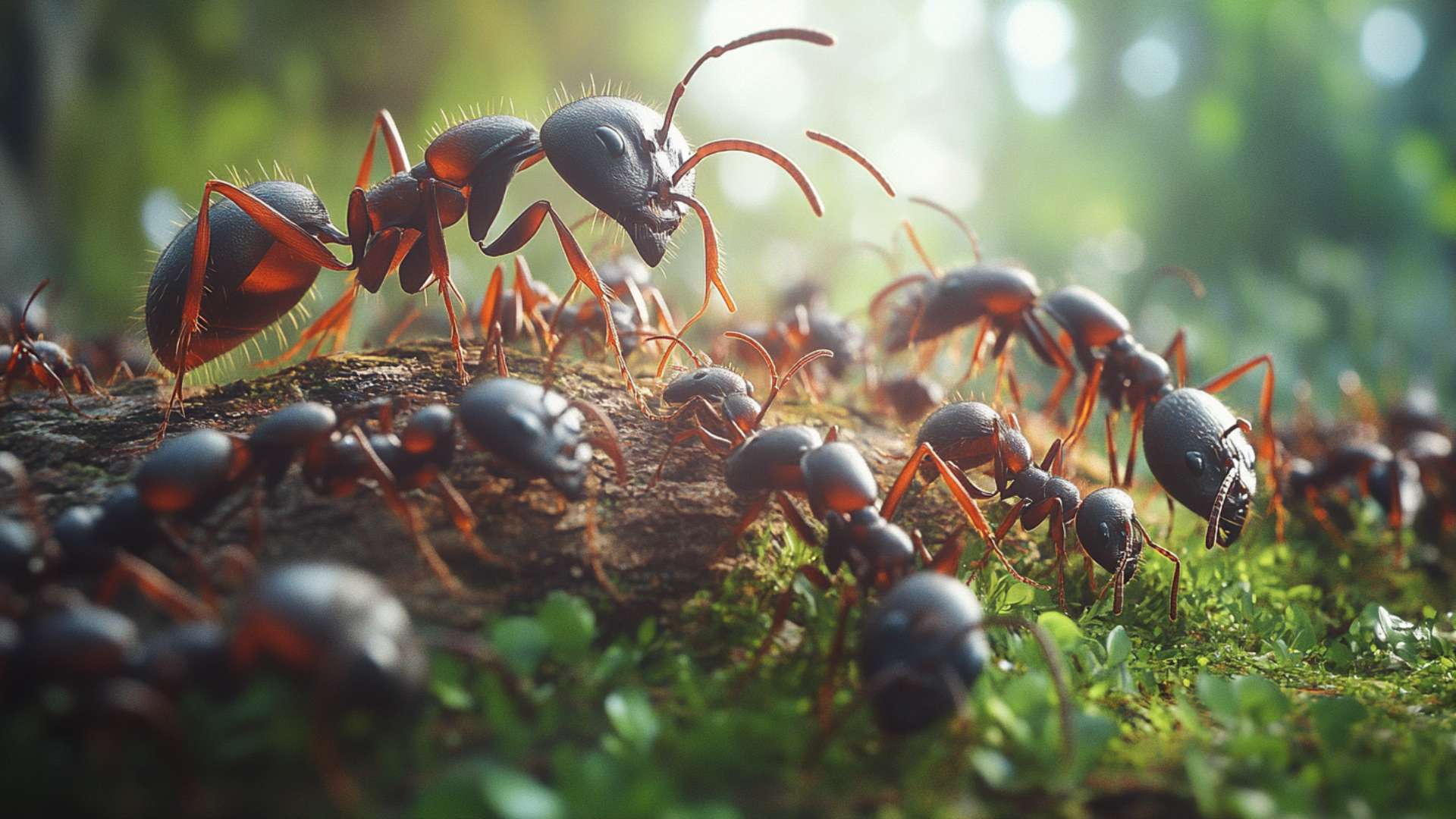When it comes to the natural world, borax is a true marvel. This mineral compound, also known as sodium borate, is formed over millions of years through the evaporation of salt lakes.
It has a crystalline structure and is typically found in dry regions around the world. While borax may not seem glamorous, it possesses incredible properties that make it highly useful in various applications.
One notable characteristic of borax is its versatility. It can be used as a cleaning agent, laundry booster, and even as a natural pesticide.
Yes, you heard that right – borax has been found to have pesticidal properties against pesky insects like ants. So not only can it help you keep your home spick and span but also aid in controlling those tiny ants that seem determined to invade your space.
Overview of Ants as Social Insects and Common Household Pests
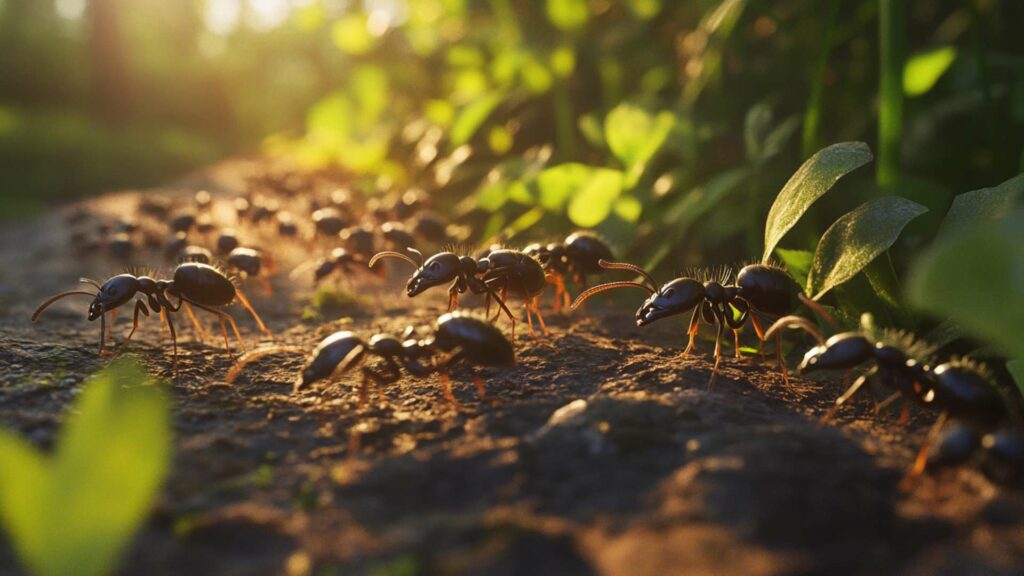
Ants are fascinating creatures that form complex social structures within their colonies. They live in highly organized communities where roles are well-defined: workers gather food, soldiers protect the nest from threats, and queens reproduce to expand the colony. However intriguing these tiny insects might be from an ecological standpoint, they often become unwelcome guests when they infiltrate our homes.
Tiny ants marching across kitchen countertops or swarming around spilled sugar can quickly become an annoyance for any homeowner. These common pests also have an uncanny ability to locate food sources with precision and communicate their findings back to their colony using pheromones.
While some species of ants are relatively harmless nuisances seeking sustenance, others like fire ants can deliver painful bites or stings. To prevent these critters from making themselves at home in our living spaces requires effective solutions tailored specifically for ant control.
This is where borax steps in as a potential game-changer, offering a natural and mildly toxic approach to tackle ant infestations head-on. So, let’s delve further into how borax can be harnessed to combat these unwelcome household invaders.
Description of Borax’s Mode of Action on Ants’ Exoskeleton
Ants, those tiny creatures that march in line and invade our homes, may seem invincible at times. However, borax has a remarkable way of bringing the ant queen and their reign to a halt.
When ants come into contact with borax, it disrupts the integrity of their exoskeletons, which are the hard outer shells that protect their bodies. You see, borax is composed of boric acid and sodium salts.
These compounds have sharp edges that can damage the waxy outer layer of an ant’s exoskeleton. As soon as an ant crawls over or ingests borax particles, these sharp edges scrape away at their exoskeleton, causing microscopic cuts and abrasions.
These injuries compromise the ant’s ability to retain moisture and ultimately lead to dehydration. As worker ants continue to carry the poisoned borax particles back to their colony, other ants come into contact with it as well.
This spreads the detrimental effects throughout the entire ant nest, and weakens its overall resilience. The combination of physical damage inflicted on individual ants and the subsequent contamination within the colony makes borax an efficient weapon against these minuscule invaders.
Explanation of How Borax Disrupts Ants’ Digestive Systems
While damaging an ant’s exoskeleton is a mighty blow against its survival, borax does not stop there; it goes even further to interfere with their digestive systems. The secret lies in how ants consume food within their colonies. Worker ants diligently forage for sustenance outside your home and transport it back to nourish their fellow members.
When they discover something good to eat – let’s say some sugary goodness – they return along a pheromone trail they laid down for others to follow suit. Now comes into play one clever use for our trusty friend Borax.
By mixing borax with tempting substances like sugar or powdered sugar, we construct a deadly bait that worker ants cannot resist. As they consume this seemingly delectable treat, the borax infiltrates their digestive system.
Once inside the ant’s body, the borax works its magic by damaging the internal organs responsible for digestion. It disrupts enzyme production and prevents proper nutrient absorption, leading to malnutrition and eventual death.
This dual attack of physical damage and internal disruption makes borax an effective ant killer that strikes at both ends of an ant’s existence. By understanding how borax affects ants’ exoskeletons and digestive systems, we gain insight into its potent ability to eliminate these pesky invaders.
Armed with this knowledge, we can employ homemade borax baits strategically placed near ant trails or nest entrances to target their vulnerability. Remember though, while essential for pest control purposes, always handle borax with caution and keep it out of reach from children and pets.
Effectiveness of Borax in Killing Ants
Discussion on the Efficacy of Borax as an Ant Killer Based on Scientific Studies
When it comes to finding an effective solution to get rid of ants, many homeowners turn to borax. Scientific studies have shown that borax can be highly effective in killing ants. This naturally occurring mineral compound works by interfering with the ants’ exoskeleton and disrupting their digestive system.
Borax acts as a desiccant, meaning it absorbs the waxy protective layer on ants’ exoskeleton, causing them to dehydrate and eventually die. Additionally, borax is toxic when ingested by ants.
When they consume foods warm water laced with borax, it affects their digestive system, leading to their demise. Multiple research studies have demonstrated the effectiveness of borax as an ant killer.
One study published in the Journal of Economic Entomology found that homemade borax baits were highly successful in eliminating ant colonies. The study showed a significant reduction in ant populations within just a few days of using borax baits.
Comparison between Borax and Other Popular Ant Control Methods
While there are various methods available for controlling ant infestations, not all are equally effective or safe for household use. When comparing borax with store-bought ant traps or other chemical-based solutions, several factors come into play. Store-bought ant traps often contain pesticides that can be harmful to humans and pets if mishandled.
These traps may attract ants initially but might not eradicate the entire colony quickly enough. On the other hand, homemade baits using borax and sugar can be highly effective at attracting ants due to the sweet scent while also delivering a lethal dose of boron compound.
Compared to boiling water or simply stirring up ant trails or nests, which may only provide temporary relief by scattering the ants, using borax to kill ants also offers a longer-lasting solution. Borax ant killer baits allow the worker ants to carry the toxic substance back to their colonies, effectively eliminating not only the visible ants but also the hidden ones residing within walls or other inaccessible areas.
With its proven efficiency in scientific studies and a safer alternative to chemical pesticides, borax stands as a highly recommended option for those seeking an effective and environmentally friendly method to combat ant infestations in their homes. Note: It’s important to exercise caution when using any type of ant control method and follow safety guidelines regarding handling and storage of borax or other substances.
Using Borax to Eradicate Ant Infestations
Step-by-Step Guide on Creating Homemade Borax Ant Baits
When it comes to combating those pesky ant infestations, homemade borax ant baits can be an effective and affordable solution. These baits work by luring ants with an irresistible mixture of borax and sugar or honey, which the ants eat and then carry back to their colonies. Once consumed, the borax disrupts their digestive systems and ultimately leads to their demise.
Here’s a step-by-step guide on how you can create your own borax ant bait:
1. Mixing Borax with Sugar or Honey to Attract Ants: In a small plastic container or bottle cap, combine equal parts of powdered sugar (or any other form of sugar) with borax. The sweetness of the sugar acts as an enticing factor for the ants while the borax acts as the lethal component that eliminates them.
2. Placement of Bait Stations near Ant Trails or Nest Entrances: Identify areas where you frequently spot ant trails or suspect their nests might be located. Place your bait stations strategically in these areas, ensuring they are easily accessible for worker ants. Consider placing them near potential entry points like windowsills, doorways, or cracks in walls.
3. Safety Precautions when Using Borax around Pets and Children: While borax is generally safe when used properly, it’s important to take precautions when using it around pets and children. Place the bait stations in areas where they cannot be easily reached by curious pets or young children.
You may even consider covering them with a small inverted container (with ventilation holes) or placing them out of reach of adult ants on elevated surfaces such as countertops. Remember, patience is key when using homemade borax ant baits.
It may take some time for the worker ants to discover the borax bait itself, consume it, and carry it back to their colonies. Additionally, keep in mind that borax baits are effective against various ant species like sugar ants but may not be as effective against carpenter ants or tiny ants with different feeding preferences.
Factors Influencing Borax’s Efficiency Against Ants
Examination of different ant species’ susceptibility to borax treatment
When it comes to exterminating those pesky ants with borax, it’s important to understand that not all ant species are created equal in terms of their susceptibility to this natural remedy. While borax can be effective against many common household ants, fewer ants may be more resilient or have unique behaviors that make them less susceptible to its effects. The first step in determining the effectiveness of borax against different ant species is identifying which ones you’re dealing with.
Common household ants include odorous house ants, pavement ants, carpenter ants, and Argentine ants. Each of these species has distinct behaviors and nesting preferences.
For example, odorous house ants are attracted to sugary substances and tend to build nests near moisture sources. On the other hand, carpenter ants burrow into wood and can cause structural damage.
Identification of common household ant species and their behaviors
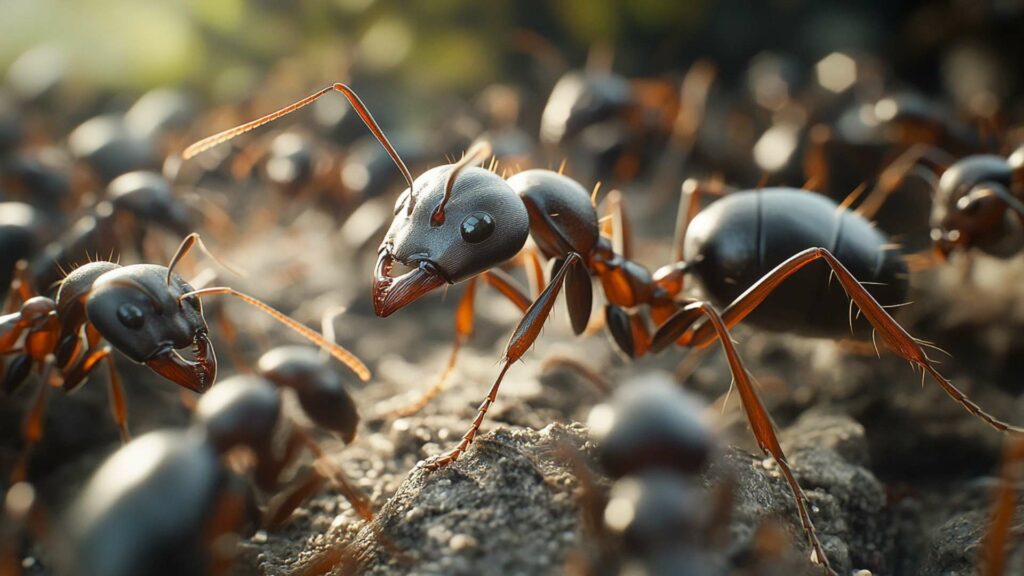
To identify the specific type of ant infestation you have at home, observe their behavior closely. Watch out for their movement patterns and nesting locations. Odorous house ants often leave a noticeable scent trail (pheromone trail) that helps them communicate with other members of the colony about food sources.
Carpenter ants may leave behind wood shavings near damaged areas or create galleries inside wooden structures. Knowing which ant species you’re dealing with is crucial because it allows you to tailor your approach to ant problems accordingly.
Borax-based ant baits are generally effective against most common household ant species due to their preference for sweet baits mixed with a small amount of borax. However, certain species may require additional strategies or alternative treatments if they prove less susceptible.
Impact of ant colony size on effectiveness
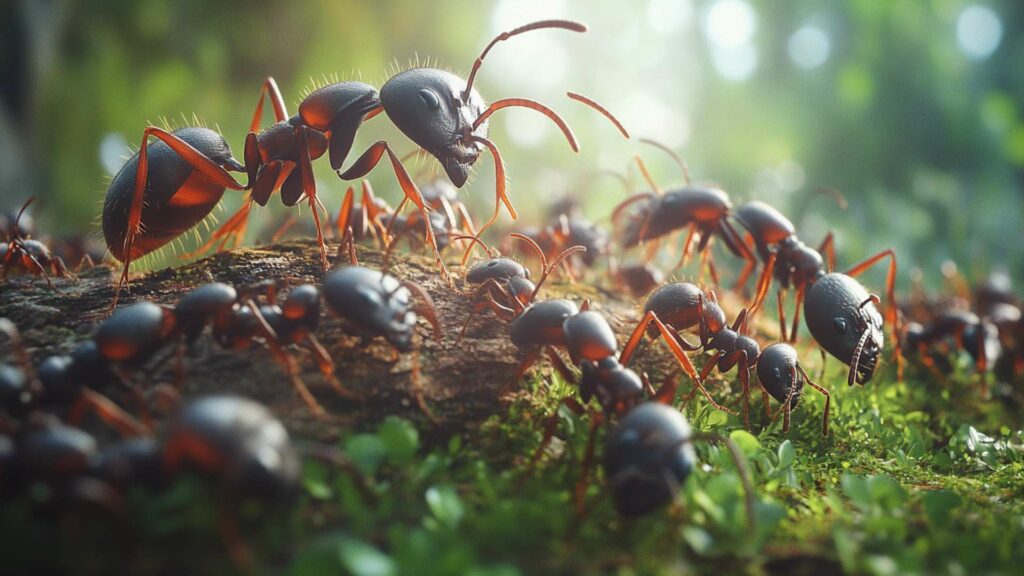
The size of the ant colony also plays a significant role in determining the effectiveness of borax as an ant killer. Small colonies with just a few dozen ants are typically easier to eradicate using both borax and ant baits.
The workers, attracted by the sweet bait, carry it back to the colony, where it can disrupt their digestive systems and ultimately kill them. However, larger ant colonies present a greater challenge.
With hundreds or even thousands of worker ants foraging for a food source, ensuring that enough workers come into contact with the bait can be more difficult. In these cases, it may be necessary to increase the number and placement of bait stations to maximize exposure and increase the likelihood of success.
By understanding which ant species you’re dealing with and considering factors such as behavior and colony size, you can better determine how effective borax will be in resolving your ant infestation woes. Remember to always follow proper application techniques and combine them with good sanitation practices for optimal results in banishing those bothersome critters from your home.
Exploring Alternative Uses for Borax in Ant Control
Usefulness of Borate-Based Dusting for Treating Outdoor Ant Mounds
When it comes to tackling outdoor ant mounds, borax proves to be a versatile tool.
One effective method is borate-based dusting, which involves sprinkling a fine layer of powdered borax directly onto the ant hills. As ants scuttle through these powdery particles, they unknowingly carry the sodium borate back to their nests, disrupting their colony from within.
The beauty of this DIY borax solution lies in its simplicity. To create your own ant-dusting mixture, combine equal parts powdered sugar and borax in a bowl.
Mix them thoroughly until you have a consistent blend. Then, venture forth armed with a trusty shaker or empty spice container filled with the mixture.
Approaching an ant mound with caution, apply a gentle but even coating of the powdered concoction over and around the entrance holes. This deceptively simple act will set in motion an invisible chain reaction that will ultimately spell doom for those pesky carpenter ants or fire ants that dare to call your property home.
Potential Benefits and Drawbacks of Incorporating Essential Oils with Boron Compounds

While borax alone may suffice as an effective ant control agent, some enthusiasts advocate for enhancing its potency by incorporating essential oils into the battle against these tiny invaders. Combining aromatic oils like peppermint or tea tree oil with sodium borate can yield impressive results when used as part of a comprehensive ant control strategy.
These essential oils act as natural repellents that deter ants from entering treated areas and disrupt their ability to communicate via scent trails. By mixing several drops of your preferred essential oil into your DIY borax ant bait, you create an enticing yet deadly concoction for unsuspecting worker ants.
However, it’s important to approach this aromatic alliance with caution. Some essential oils may be toxic to pets or pose a risk of skin irritation in humans.
Always research the specific oil and its potential effects before incorporating it into your ant control routine. Additionally, essential oil potency may vary, so experiment with different concentrations to find what works best for your particular ant infestation.
Exploring alternative uses for borax in ant control offers a range of innovative solutions. From dusting outdoor ant mounds with borate powder to enhancing the effectiveness of borax baits with essential oils, homeowners can adapt and experiment to find the most suitable method for their specific circumstances.
Remember to approach these alternatives responsibly and prioritize safety when using any substances around your home. With patience and persistence, you can reclaim your territory from those relentless ants and restore peace within your abode.
Safety Considerations When Using Borax for Ant Control
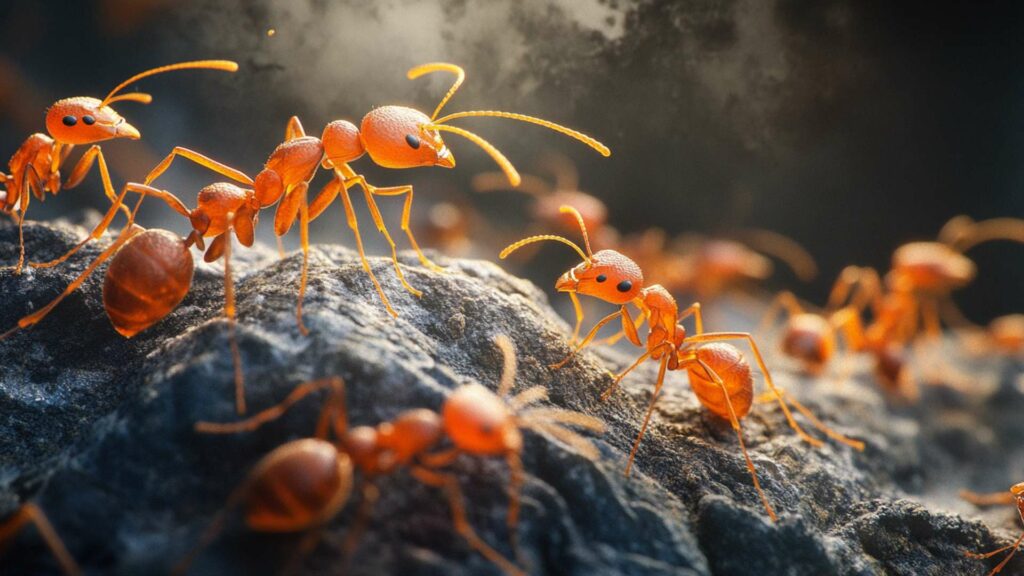
Guidelines for Proper Handling, Storage, and Disposal
Ant control is a common household concern, and borax has proven to be an effective solution against these pesky pests. However, it is crucial to prioritize safety when handling, storing, and disposing of borax.
To ensure the well-being of your family and pets, follow these guidelines:
1. Protective Measures: When handling borax or preparing ant baits with it, wear gloves as a precautionary measure. This will prevent direct contact with the skin and minimize any potential skin irritation. Additionally, consider wearing a mask to avoid inhaling the fine powder.
2. Storage: Store borax in a secure location away from children and pets. Choose a cool, dry area that is inaccessible to curious hands or paws. Keep the container tightly sealed to prevent accidental spills or exposure.
3. Disposal: If you have leftover borax mixture or expired ant baits containing borax, it’s important to dispose of them properly. Do not pour them down the drain or flush them down the toilet as they may contaminate water sources. Instead, seal them in a plastic bag and discard them with your regular household waste.
Potential Risks Associated with Misuse or Overuse
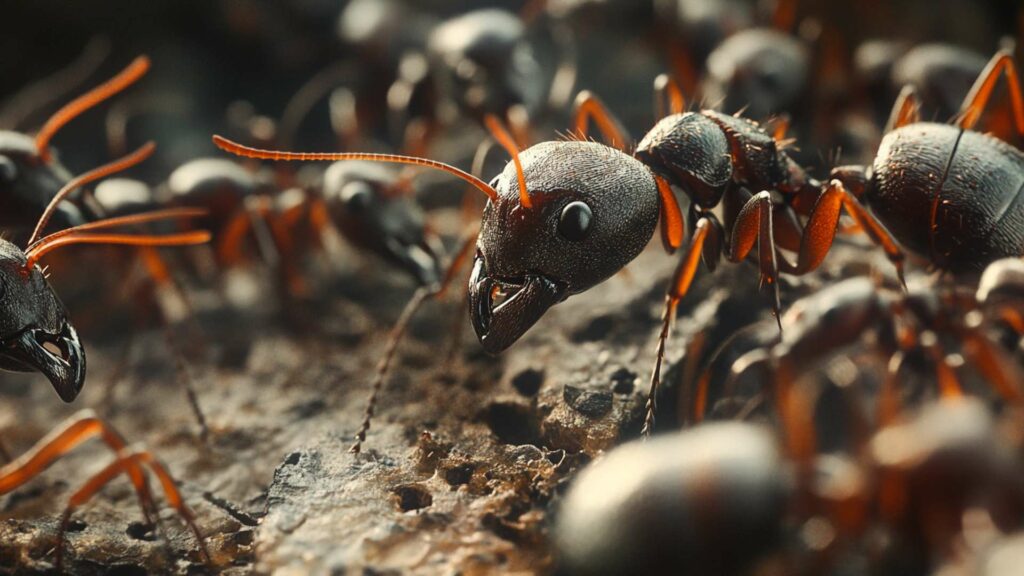
While borax can be an effective ant killer when used correctly, it’s essential to avoid overusing or misusing this substance. Over-application of borax can lead to unintended consequences:
1. Harmful Effects on Pets: Pets are often curious creatures who might come into contact with ant baits containing borax if not properly placed out of their reach. Ingesting too much borax solution can cause digestive system issues for animals. Therefore, when using borax as an ant control method, ensure that pets cannot access the treated areas.
2. Impact on Other Insects: While borax effectively targets ants, it may also affect other beneficial insects if used indiscriminately. Be mindful of the environment and avoid applying excessive amounts of borax in outdoor areas where non-pest insects reside.
3. Risks of Contamination: Misuse or overuse of borax can lead to contamination of food preparation surfaces or utensils. When using borax to create ant baits, be cautious not to place them directly on surfaces that come into contact with food.
Instead, opt for discreet placements such as paper plates or cotton balls to minimize any potential risk. By adhering to these safety guidelines and avoiding overuse or misuse, you can effectively harness the power of borax while safeguarding your household’s well-being and the environment around you.
Myths and Misconceptions
Borax is Harmful to Pets and Children
One common misconception about using borax as an ant killer is that it poses a significant risk to pets and children. However, when used responsibly and in appropriate amounts, borax is generally safe. It’s essential to take precautions such as keeping the ant baits out of reach of children and placing them in areas where pets cannot access them. Furthermore, using borax solutions instead of borax powder can minimize potential contact or inhalation risks. By following these guidelines, you can effectively control ants without putting your loved ones at risk.
Borax Kills Ants Instantly
Another myth surrounding the use of borax for ant control is that it provides immediate results. While borax is indeed effective in killing ants, it does not act instantaneously. When ants come into contact with the bait, they consume it and carry it back to their colony, allowing the poison to spread throughout the entire population over time. This process may take several days or even weeks, depending on factors such as the size of the colony and the different species of ants being targeted.
Borax Works for All Ant Species
There is a widespread belief that borax works equally well against all types of ants, which isn’t entirely accurate. While many ant species are vulnerable to borax-based ant baits, some may be less responsive due to variations in their dietary preferences or behavioral traits. For example, carpenter ants are known for their wood-damaging tendencies but may not be attracted to sugar-based baits commonly used with boron compounds like borax. Therefore, understanding the specific ant species you are dealing with can help determine if alternative methods or bait formulations are necessary.
Conclusion
Does borax kill ants? The answer is a resounding yes. When used correctly, borax can be an effective and affordable solution for controlling ant infestations.
By creating homemade ant baits using borax and sugar, you can exploit ants’ attraction to sweet substances while delivering a lethal dose of poison to the entire colony. Remember to exercise caution when using borax around pets and children, following safety guidelines to minimize any potential risks.
With persistence and proper application, you can triumph over even the most stubborn ant colonies. So arm yourself with some borax, a cotton ball drenched in a potent mixture of boron compound and sugar, placed on a plastic lid near those pesky pheromone trails.
Watch as the ants unwittingly carry their demise back to their nest, unknowingly spreading the sticky substance among their peers. In just a few weeks, your home will be free from these tiny intruders thanks to the power of borax!
Deter Ants with D-Termination: Las Vegas’ Leading Pest Control Service!

If you’re grappling with ant problems, D-Termination is your go-to. Our proficient team excels at discouraging ants, rejuvenating cleanliness, and preserving the integrity of your surroundings. Bid farewell to ants—opt for D-Termination for effective pest control today!
Reach out to us at 702-919-6310 or visit dtermination.com to schedule your ant control service and regain your space from these unwanted pests.
Frequently Asked Questions:
Borax can take several days to kill ants, depending on the type of ant and bait used.
Borax is typically used by mixing it with sugar and water to create a bait.
Borax is often considered more effective than baking soda for killing ants due to its toxicity.
Yes, 20 Mule Team borax is a commonly used product to make homemade ant baits.

